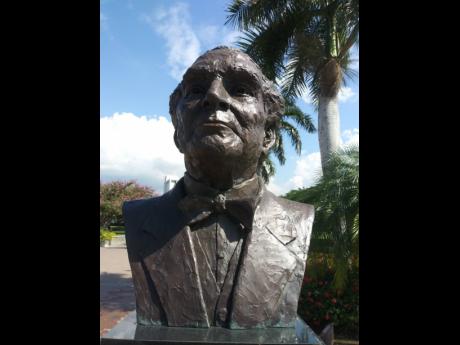Bustamante and Norman Manley – the fathers of Jamaica’s political Independence
ALEXANDER BUSTAMANTE and Norman Washington Manley are widely regarded as the fathers of Jamaica’s political independence, the process of which ended on August 6, 1962 when Jamaica officially ceased to be a colony of Britain. There were also a new flag, a new anthem, and a new structure of government in which a governor general represents the British monarch as head of state.
Bustamante and Manley were cousins who evolved into political rivals, creating Jamaica’s main political parties – the People’s National Party and the Jamaica Labour Party. Bustamante was born William Alexander Clarke in Blenheim, Hanover on February 24, 1884. He got the name Bustamante from a sea captain who befriended him early in his life. The name change was formally done by deed poll in 1944. He was popularly called ‘Busta’ for the rest of his life.
From 1903 to 1933, Busta lived and worked in many countries in South and Central America. Upon his return to Jamaica, he grew to dislike the Crown Colony system that governed Jamaica. He thought it was replete with social and economic challenges for the working class whom he mobilised. He championed their cause in the 1937-1938 outbreak of an islandwide social unrest. For his role as spokesman and champion of labour, he was imprisoned.
FIRST CHIEF MINISTER
On September 8, 1940, he was detained at Up Park Camp for an alleged violation of the Defence of the Realm Act. He was released 17 months later, after which he founded the Bustamante Industrial Trade Union in 1943, and the Jamaica Labour Party in 1944. He won Jamaica’s first general election under Universal Adult Sufferage and became the first chief minister of Jamaica, from 1944 to 1955.
In 1958, Jamaica became a part of the West Indies Federation. But Bustamante was not all-embracing of a federation. His mind and attitude changed, and so he began to advocate for Jamaica’s withdrawal from the federation and a move towards Independence. Through a special referendum, Jamaica voted to cede from the federation, a move that eventually nullified the federation.
Along with Norman Manley, Bustamante helped to frame the Jamaican Constitution of 1962, in preparation for Jamaica’s independence from Britain. After leading the JLP to victory in the 1962 elections, Busta became Jamaica’s first prime minister. Five years later, in 1967, he resigned. Bustamante was bestowed with the honour of National Hero in October 1969. He died in August 1977 at age 93. He was the only living national hero.
“Bustamante is honoured in his homeland as a champion of the poor and oppressed, for his role in organising labour, and for his part in furthering the nationalist movement by his challenge to colonial authority,” Olive Senior writes in Encyclopedia of Jamaica Heritage.
While Busta was the first chief minister and first prime minister, Norman Manley was the first and only premier, from 1959 to 1962. He was also chief minister of Jamaica, from 1955-1959. The Rhodes scholar, athlete, soldier, lawyer, and politician was born in Roxborough, Manchester.
FIRST JAMAICAN BARRISTER
In 1932, he was made a King’s Counsel, and between then and 1955, he became the undisputed leader of the Jamaican bar. He was the first Jamaican barrister to appear before the Judicial Committee of the Privy Council in England.
He founded the People’s National Party in 1938 and was its president for 31 years. He helped to arrange constitutional reform leading to self-government, and insisted on Universal Adult Suffrage, which was attained in 1944.
When he was chief minister, Manley pressed for increasing constitutional advances, among them a Cabinet to replace the Executive Council, and reduction in the power of the colonial secretary. Under his leadership in 1959, Jamaica achieved full internal self-government based on a new Constitution.
He was a strong advocate for the Federation of the West Indies. Yet, Busta was not, thus the special referendum of September 19, 1961. The people voted against the federation and Manley became instrumental in framing Jamaica’s Independence constitution. He died in 1969, the same year he was conferred with the title of National Hero.
“Aside from the significant role he played in the constitutional advancement of the nation, Norman Manley also laid the foundation for social welfare development among the poor through Jamaica Welfare, which he was instrumental in forming in 1937,” Senior writes.



